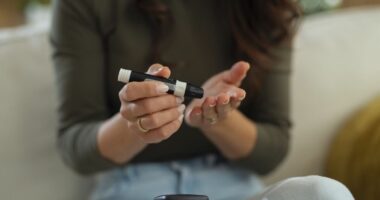Share this @internewscast.com
Rechelle Coombes never thought her body would let her down.
She was 35, living in London and had a dream job in marketing. She was even making plans to travel the world – but something was worrying her.
Her breathing was more laboured than usual, so she went to a doctor and discovered her ‘blood pressure and blood sugar were really high’.
Rechelle had lived with Type 1 diabetes since she was 12 and was no stranger to regular check-ups. She assumed the symptoms were part of her condition – probably exacerbated by work stress.
But within months, things got worse.
Soon after returning to her native Australia in January 2023, she was rushed to hospital with severe breathlessness.
That’s when she received the news that changed everything.
‘You’re in end-stage kidney failure,’ the doctor said.

At the age of 12, Rechelle Coombes was diagnosed with Type 1 diabetes and has had regular doctors appointments ever since. In January 2023, she was diagnosed with kidney failure
Rechelle, now 38 and living in Melbourne, knew kidney failure was a possible long-term complication of Type 1 diabetes – but the speed of her decline was shocking.
‘By the time I returned home in January 2023, I had lost half of my kidney function in six months and no one picked up on it.’
From the outside, she looked healthy – but the reality was far more complex.
She couldn’t do high-intensity cardio workouts, struggled walking up hills, and often had brain fog and fatigue. Even then, Rechelle hadn’t realised just how bad it was.
She describes it as ‘being trapped in a house that looks lovely from the outside but you’re screaming from a locked room inside’.
Doctors initially told her to manage the condition with blood pressure medication and a low-salt diet.
‘So I did what they said – but my kidney function dropped again from 30 per cent to 19 per cent in a year,’ she explains.
With her health deteriorating, Rechelle was given two options: dialysis or a transplant.

She is currently fourth on the waitlist for an organ transplant and has to keep her phone on 24/7 as the hospital could call at any time
Doctors said a transplant would generally be considered better than dialysis because it offered longer life expectancy, a better quality of life, and fewer dietary restrictions.
But it wasn’t that simple. In addition to the waiting list for a transplant, Rechelle faced the morbid prospect of knowing that ‘someone has to die to give me an opportunity to live’.
‘Generally, the person’s organs that you receive need to be younger than yours so they last longer. That means someone younger than 38 has to die for me. They lose their life and I get a second chance.’
Friends offered to donate their kidneys, but she turned them down.
‘I’ve had friends with kids offer me one of their kidneys but, while I was grateful, I said no because you can only give away one. What if one of their children needs it?’
Determined to take control of her health, Rechelle began doing research of her own and discovered a study that found Ozempic – the weight loss wonder drug – helped to slow down kidney failure in patients with diabetes.
For someone waiting for a kidney transplant, that could save their life.

Now 38, Rechelle describes her life as ‘being trapped in a house that looks lovely from the outside but you’re screaming from a locked room inside’
Last May, a major study published in the New England Journal of Medicine found that semaglutide – the active ingredient in Ozempic – reduced the risk of major kidney events by 24 per cent in people with Type 2 diabetes and chronic kidney disease.
‘When I found out about it on my own, after months of medical gaslighting, I felt betrayed. The solution was always there – I just hadn’t fit the profile to be told,’ she tells me.
‘I thought it would be my best chance to avoid dialysis. Why wouldn’t I try it?’
She returned to her doctor and asked why she hadn’t been offered Ozempic, given the research had already been published.
‘We only offer it to some patients who are above 20 per cent kidney function,’ she was told. Rechelle was furious. A year earlier, she still had 30 per cent kidney function.
That night, she went home and ordered Ozempic through an online pharmacy. It was delivered to her door the following day.
In June 2024, she started taking a low dosage of the drug, while carefully monitoring her health and side effects.
‘I had really bad nausea and was vomiting for the first two weeks. I lost quite a bit of weight while I was on it, too. I’m 5’1 and dropped to 49kg (108lbs or 7st 10lbs). My body was ripped,’ Rechelle says.
After three months on the drug, she saw a significant improvement at her next routine kidney check.
‘For the first time in a year, my kidney function didn’t decline. At every other appointment, the level had dropped,’ she says.
‘I knew it was working at the six-month mark because the levels remained steady at another check-up.’
She stopped taking Ozempic in April this year so she could undergo egg-freezing treatment at the recommendation of doctors.
Rechelle also felt ready to come off the jabs because she had lost too much weight.
While her Ozempic journey may be over, she firmly believes the drug stabilised her condition while awaiting a transplant. ‘Ozempic has given me back time,’ she says.
As of publication, she is fourth on the waitlist for an organ transplant and is waiting by the phone for the call from the hospital.
‘It could be tomorrow, it could be another year, no one knows,’ she tells me.
At this stage, Rechelle is uncertain whether she’ll go back on Ozempic – but she’s open to it, having seen its potential to stop kidney failure in its tracks.
‘The hardest part has been losing myself and feeling like that healthy version of me will never come back again,’ she adds.
‘You don’t realise how fragile life is. When you have a sickness, it changes your perspective on pretty much everything.
‘But here’s what I’ve learnt: better doesn’t have to mean cured. For me, feeling better is about choosing to focus on what matters – and letting go of what doesn’t.’
More than anything, she wants other women to advocate for themselves when they are in an appointment with a doctor who isn’t listening to them.
‘No doctor cares about your life as much as you do,’ she says.












